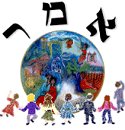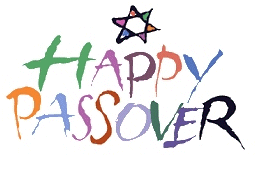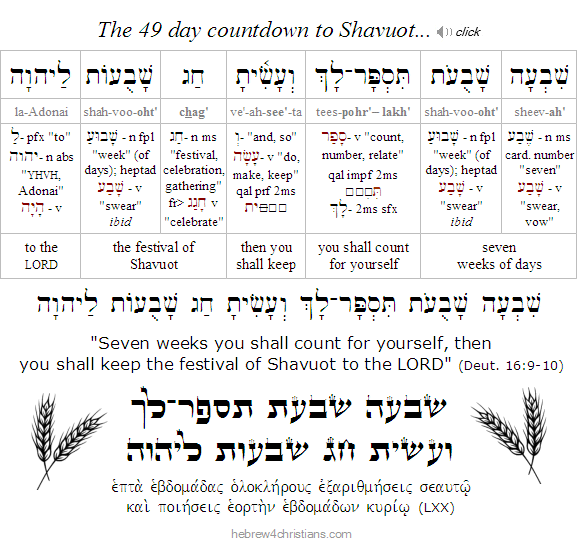|
|
|||||||||||||||||||||
 |
|||||||||||||||||||||
 |
|||||||||||||||||||||
|
|
||||||||||||||||||||||||||||||
|
Click on the Parashah name to read the summary: |
|
|
|
God's Appointed Times... |
|
Our Torah portion for this week (parashat Emor) lists the eight main holidays revealed in the Jewish Scriptures. In the Torah, these "holidays" are called "appointed times" (i.e., mo'edim: מוֹעֲדִים), a word which comes from the Hebrew root meaning witness (עֵד). Other words formed from this root include edah (עֵדָה), a congregation, edut (עֵדוּת), a testimony, and so on. The related verb ya'ad (יָעַד) means to meet, assemble, or even to betroth. The significance of the holy days, then, is for the covenant people of the LORD to bear witness to God's love and faithfulness.
|
|
|
||||||||||||||||||||||
|
"Second Chance" Passover |
||||||||||||||||||||||
|
Passover is the only festival that the LORD our God made special provision so that if someone missed the occasion (on account of illness, ritual impurity, or some other reason), he or she could make it up 30 days later on Iyyar 14 (see Num. 9:9-12). This "second chance" Passover is called Pesach Sheni (פֶּסַח שֵׁנִי) or Pesach Katan ("little Passover"), the seder of which is observed under the full moon of Iyyar 15 (this year Sunday, May 11th at sundown). Among the ultra-orthodox, it has become customary to eat some leftover matzah from the first Passover on this time to commemorate the holiday.
|
||||||||||||||||||||||
|
|
||||||||||||||||||||||
|
Counting the Omer - ספירת העומר |
||||||||||||||||||||||
|
We are in the midst of Sefirat Ha-Omer (the "Counting of the Omer"), a 49 day countdown that runs from Nisan 16 through Sivan 5. The first day of the omer count begins on the second day of Passover, and the last day occurs the day before Shavuot ("Pentecost"). On our Gregorian calendars, these dates run from Mon. April 14th through Sat. May 31st this year. This is a "countdown period" leading to the giving of the Torah at Sinai and the giving of the Holy Spirit to Yeshua's disciples...
|
||||||||||||||||||||||
|
|
||||||||||||||||||||||
|
Lag B'Omer - 33rd Day of the Omer |
||||||||||||||||||||||
|
After sundown Saturday, May 25th, marks the 33rd day of the omer count, called Lag B'Omer (ל״ג בעומר), which later became a "Kabbalistic" (i.e., mystical) holiday that commemorated the teaching of Rabbi Shimon bar Yochai (i.e, Rashbi: רשב"י), the purported author of the Zohar, a fundamental text of Kabbalah (Jewish mysticism). According to tradition, on the day of his death, Rabbi Shimon revealed the "deepest secrets" of the Kabbalah to his followers and insisted that they would thereafter celebrate the anniversary of his death (Yahrzeit) with joy. His followers then associated his death on Iyyar 18 with the anniversary of the revelation of Kabbalah (i.e., HaTorah ha'nisteret: התורה הנסתרת) to Israel. Among Kabbalists, Lag B'Omer celebrates the giving of the "mystical Torah" to Israel just as the holiday of Shavuot celebrates the giving of the written Torah. Today Lag B'Omer "bonfire" celebrations are held in the village of Meron (near Safed, Israel) where the Rashbi is buried to mystically recall the "sparks that fly upward," back to God... Lag B'Omer also commemorates the reprieve of a plague that caused the death of thousands of Rabbi Akiva's students during the last of the Jewish-Roman wars (called the Bar Kochba Revolt (מרד בר כוכבא), c.132-135 AD). Since Jewish tradition assumed that the Messiah would be a military leader who would deliver the Jews and usher in world peace, Rabbi Akiva (incorrectly) surmised that Shimon bar Kochba, the leader of the Jewish resistance, was the Jewish Messiah -- based on an esoteric reading of Numbers 24:17: כּוֹכָב מִיַּעֲקב - "A star shall come out of Jacob" ("Bar Kokhba" means "son of a star" in Aramaic). His tragic endorsement led to death of countless Jews and further alienated the Messianic Jewish community from Israel. The eventual defeat of the Jews by Emperor Hadrian marked the sure beginning of the Jewish Diaspora from the Promised Land. The province of Judaea was then renamed "Palestine" and Jerusalem was called Aelia Capitolina.
|
||||||||||||||||||||||
|
Blessing before Torah Study: |
||||||||||||||||||||||
|
Some terms: |
||||||||||||||||||||||
|
||||||||||||||||||||||
 |
||||||||||||||||||||||
|
Related Topics: |
||||||||||||||||||||||
|
Hebrew for Christians |
||||||||||||||||||||||
|
||||||||||||||||||||||






